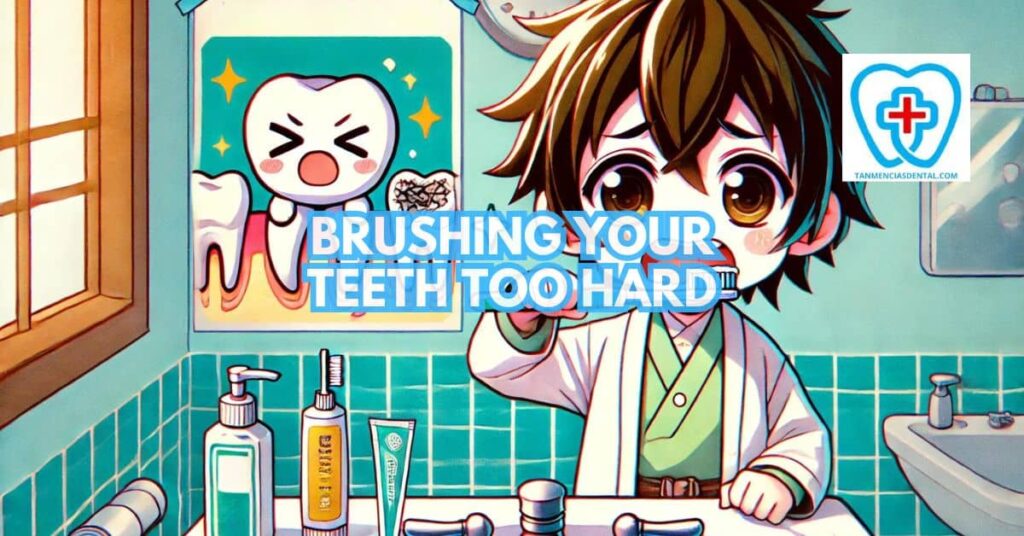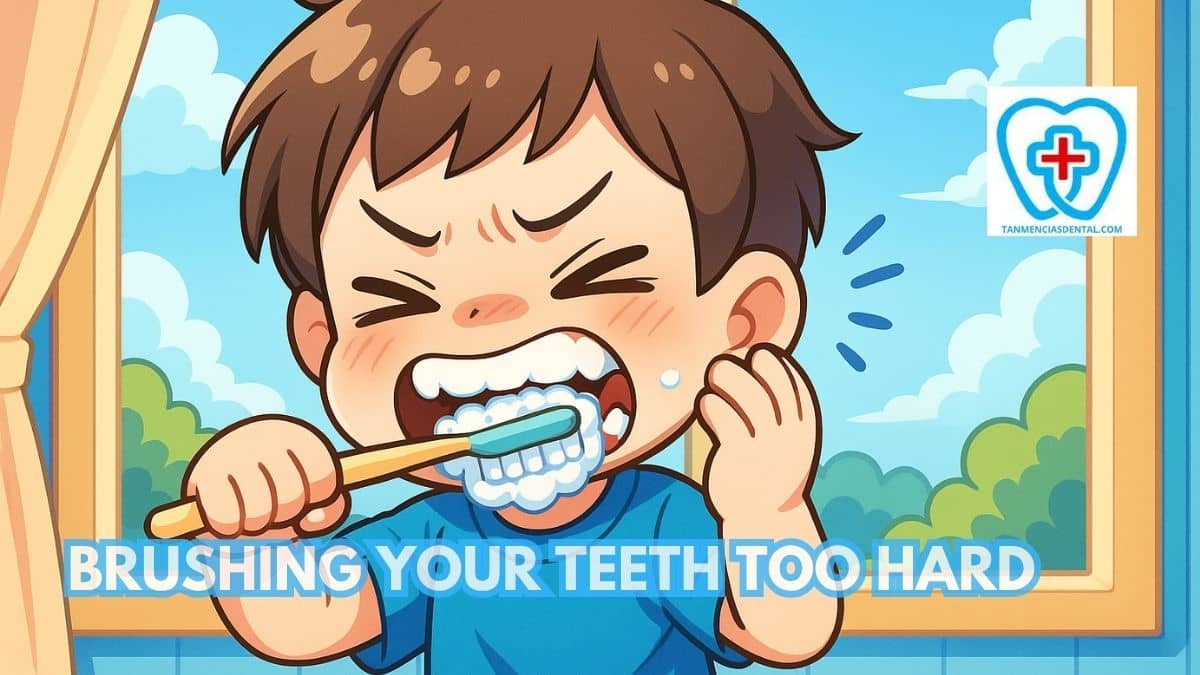Brushing your teeth is an important part of keeping your mouth healthy.
However, brushing your teeth too hard can cause damage to your enamel and gums.
Many people think harder brushing cleans better, but this can lead to problems like sensitivity and gum pain.
Knowing the risks of brushing too hard can help you change your habits for the better.
We’ll explain why gentle brushing works best and how to protect your smile for years to come.
1. Why Do People Brush Too Hard and How to Change It
Many people think brushing harder cleans teeth better, but this is not true.
This belief can come from habits learned over time or from seeing others brush that way.
Some feel their teeth are cleaner when they brush with force, even though it can cause damage.
To change this, try paying attention to how much pressure you use while brushing.
Practicing gentle, slow movements can help you form a safer brushing habit that protects your teeth and gums.
🦷 When Can You Eat After Brushing Your Teeth?
2. Forget the Scrub: Why Gentleness Wins When Brushing Your Teeth
Gentle brushing is more effective and safer for your teeth and gums than aggressive scrubbing.
When you brush too hard, you can wear away the enamel on your teeth and cause damage to the gum line.
This damage can lead to tooth sensitivity and make it easier for cavities and infections to develop.
Using a soft-bristled toothbrush and gentle, circular motions helps remove plaque and food particles without harming your teeth or gums.
This careful method protects both the enamel and the delicate gum line, which is important for good oral care.
Brushing gently also feels more comfortable and reduces the chance of causing bleeding or soreness in your gums.
By choosing gentleness over scrubbing, you support healthier teeth and gums in the long run.
🦷 How to Find the Best Dental Implants in Marikina Clinics and Specialists
3. Enamel Under Attack: How Brushing Too Hard Can Damage Your Teeth
Enamel, the outer protective layer of your teeth, can be worn down by brushing too hard.
This erosion makes teeth more susceptible to cavities, decay, and increased sensitivity to hot and cold.
Using a softer toothbrush and gentle pressure helps maintain the integrity of your enamel.
Avoiding abrasive toothpaste can also reduce the risk of enamel damage.
Protecting your enamel is essential for keeping your teeth healthy and strong.
🦷 Can You Catch Gingivitis? Brushing Up on Contagious Gum Disease
4. Receding Gums: The Brushing Habit That Can Backfire
Brushing too hard can cause your gums to recede, exposing the sensitive roots of your teeth.
Gum recession can lead to discomfort, an increased risk of infection, and even tooth loss if left untreated.
To prevent this, use gentle strokes and avoid applying excessive pressure when brushing.
Regular dental checkups can help identify early signs of gum recession and provide guidance on proper brushing techniques to prevent further damage.
Maintaining gentle brushing habits can protect your gums and ensure a healthier mouth.
🦷 Flossing for the Win: Best Floss for Gingivitis and Healthy Gums

5. Brushing Too Hard? Here’s How to Tell
If you notice frayed bristles on your toothbrush, it’s a clear sign that you’re brushing too hard.
Other indicators include sensitive teeth, sore or bleeding gums, and visible gum recession.
Over time, aggressive brushing can also lead to increased tooth sensitivity and enamel erosion.
Paying attention to these signs can help you adjust your technique to avoid further damage.
Consulting with your dentist can provide additional insights and confirm if your brushing habits need to change.
🦷 How Much Does It Cost for a Dental Checkup?
6. Mastering the Technique: Brushing for Clean Teeth and Healthy Gums
The key to effective brushing is using a soft-bristled toothbrush and gentle, circular motions.
Start by placing the toothbrush at a 45-degree angle to your gums and moving it in small, circular strokes.
Make sure to cover all surfaces of your teeth, including the outer, inner, and chewing surfaces, for at least two minutes.
Avoid using a back-and-forth motion, as this can be harsh on your teeth and gums.
Brushing gently ensures thorough cleaning while protecting your oral health.
🦷 How Long Should You Brush Your Teeth With Braces?
7. Power Up or Power Down? Electric Toothbrushes and Brushing Pressure
Electric toothbrushes can enhance your brushing routine, but using them correctly is crucial.
These devices are designed to do most of the work, so you don’t need to apply much pressure.
Many electric toothbrushes come with built-in pressure sensors that alert you if you’re brushing too hard.
Let the brush glide over your teeth and gums, allowing the bristles to clean effectively without excessive force.
This approach can improve your oral hygiene while preventing damage from overbrushing.
🦷 How a Timer for Brushing Your Teeth Can Make You a Brushing Master
8. Brushing After Eating: Timing is Everything, Especially for Sensitive Teeth
Brushing immediately after eating, particularly acidic foods, can harm your enamel.
It’s best to wait at least 30 minutes to allow your saliva to neutralize the acids and protect your enamel.
During this waiting period, you can rinse your mouth with water to help remove food particles and acids.
For those with sensitive teeth, this practice is especially important to prevent further enamel erosion.
Proper timing ensures that brushing helps maintain oral health without causing additional harm.
🦷 How To Make Brushing Teeth Fun For Toddlers
9. Don’t Get Attached: How Often to Replace Your Toothbrush
Replacing your toothbrush every three to four months is essential for maintaining effective oral hygiene.
Worn-out bristles can become frayed and lose their ability to clean teeth properly, leading to ineffective brushing.
Additionally, old toothbrushes can harbor bacteria, which can cause oral infections and other health issues.
Regularly switching to a new toothbrush ensures that you’re using a tool that can effectively remove plaque and food particles.
If you notice the bristles becoming worn before the three-month mark, it’s a sign you may be brushing too hard and need to adjust your technique.
🦷 Why Are Tooth Doctors Important for Your Family’s Dental Care?
10. When in Doubt, See a Dentist: Addressing Concerns About Brushing Habits
If you’re unsure whether you’re brushing too hard or correctly, it’s always best to consult your dentist.
They can provide personalized advice based on an assessment of your oral health and demonstrate the proper brushing technique.
Regular dental visits are crucial for catching any early signs of damage caused by improper brushing habits.
Your dentist can also recommend the best toothbrush and toothpaste for your specific needs.
Seeking professional guidance ensures that you’re maintaining optimal oral hygiene and preventing potential issues.
🦷 What are The Best Products for Gingivitis That Actually Work
11. Brushing for a Lifetime: Gentle Habits for a Healthy Smile
Establishing gentle brushing habits early on can lead to a lifetime of healthy teeth and gums.
Encourage children to use soft-bristled brushes and gentle, circular motions to clean their teeth effectively without causing harm.
As they grow, maintaining these habits will help prevent enamel erosion and gum recession.
Educating everyone in your household about proper brushing techniques promotes overall dental health.
Consistent, gentle brushing ensures a bright, healthy smile for years to come.
🦷 Comprehensive Family Dentistry in Marikina
👨⚕️ Conclusion
Brushing your teeth too hard can cause significant harm to your enamel and gums, leading to long-term dental issues.
Adopting a gentler technique, using soft-bristled toothbrushes, and brushing for the recommended two minutes can help protect your oral health.
Paying attention to the signs of overbrushing and seeking advice from your dentist can further ensure you’re taking the best care of your teeth.
Remember, gentle brushing is the key to maintaining a healthy, beautiful smile.
By making these small adjustments, you can enjoy better oral health and prevent potential problems down the road.
😊 Self-Promotion
Visit Tan-Mencias Dental Clinic in Parang, Marikina City, for a friendly and professional dental experience.
Our dedicated team is here to address all your dental needs and ensure you leave with a bright smile.
You can easily reach us for any questions or concerns by calling 9171451074, contacting us via our Facebook page, or via the contact form on our website.
We pride ourselves on providing top-notch dental care in a welcoming environment.
Contact us today to schedule your appointment and take the first step towards better oral health!

